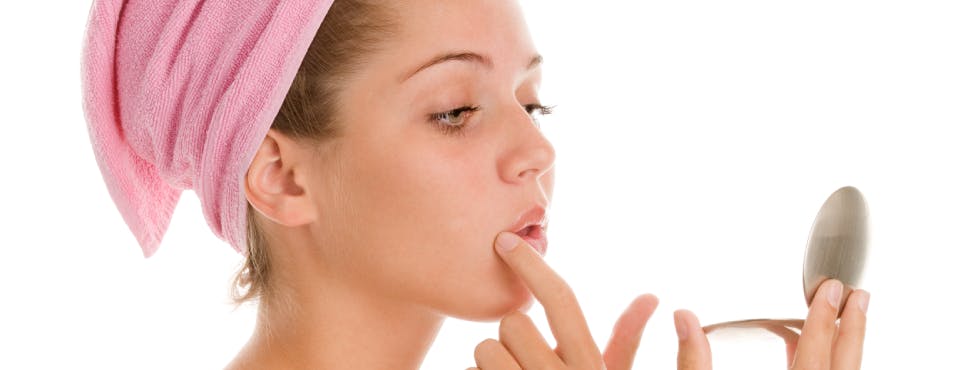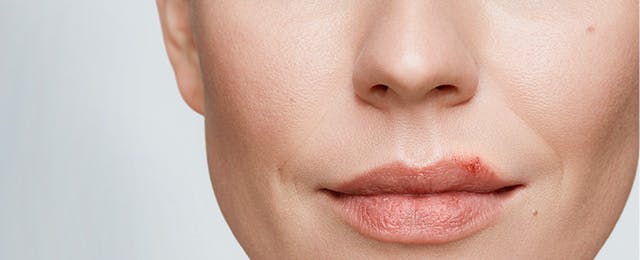
Learn All About Cold Sores in Teen
If you’re a parent, it’s important to learn about cold sores in teens, including their causes, symptoms and treatment options.
What Causes Cold Sores?
Cold sores are caused by the HSV-1 virus (herpes simplex virus type 1).1 The first outbreak is usually the most severe.2 It’s important to note that HSV can easily be spread from one teenager to another by kissing, touching, or sharing utensils and other objects.1 Adults in the household who have cold sores can also spread them to a teen.
What Are the Signs & Symptoms of Cold Sores in Teens?
Cold sores first form blisters on the lips and around the mouth. This can make eating painful. Cold sores are filled with fluid, but will crust over, scab, and then go away.1,2
HSV can cause redness and swelling of the gums. In addition, the teen may experience fever, achy muscles, swollen neck glands and just not feeling well.1
Once a teen is exposed to cold sores and HSV, he or she may not experience any symptoms. But symptoms may flare up later again later in their life from:1
- Other infections
- A fever
- Sunlight
- Cold weather
- Menstrual periods
- Stress
If the HSV returns, there may be a tingling and numbness around the mouth before the blisters appear.1
How do Teens Get Cold Sores?
Teens can get cold sores by making contact with other people their age. Teens can also get HSV through kissing or touching a person with cold sores. They can also contact it if they share utensils, towels, or other items with an infected person. That’s why many kids get infected with HSV-1 during the preschool years.1
How Can Teens Spread Cold Sores?
HSV and cold sores are spread through direct contact with another person, the fluid from cold sore, or the saliva of the infected person. It spreads the same way for kids as it does for adults.1
How can you help prevent teens from getting cold sores/HSV?
Parents should make sure that their teens don’t share cups, toothbrushes, or eating utensils. Teens with cold sores should avoid kissing others until the sore clears up and heals. They should also be sure to wash their hands thoroughly and often, especially after touching a cold sore. They should also avoid touching their eyes, as HSV infections in the eye can be serious.1
Adults who are taking care of a teen with a cold sore should be mindful to wash their hands often, so they avoid spread it to others or HSV themselves.1
How Do You Treat Cold Sores in Teens?
While there are no medicines that can cure HSV, there are some treatments can help make shorten the duration a teenager has a cold sore and make them less painful:1,2
- Applying a cold compress can help relieve pain and discomfort.
- A doctor may recommend an over the counter or treatment.
- A cool drink or cold foods may help make a teenager more comfortable.
If your teen has a cold sore, you should call a doctor when:1
- • The teen has a weakened immune system, as this may allow the HSV infection to spread to other parts of the body and cause problems.
- • The sores have not healed themselves within 2 weeks.
- • The cold sore is near or irritating the eyes.
- • The teen tends to get a lot of cold sores.
Now that you know more about cold sores in teens, treatment options, learn more about signs and symptoms, causes, and myths and facts about cold sores.
SOURCES
1. Cold Sores (HSV-1). TeensHealth from Nemours. https://kidshealth.org/en/teens/cold-sores.html. Accessed 4/15/21. Referenced text indicated in sourcing doc.
2. For Teens: Understanding Herpes. UC San Diego Health. https://myhealth.ucsd.edu/Search/3,87035. Accessed 4/15/21. Referenced text indicated in sourcing doc.
By clicking the link(s) above, you will be taken to an external website that is independently operated and not managed by Haleon. Haleon assumes no responsibility for the content on the website. If you do not wish to leave this website, do not click on the links above.




